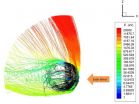(Press-News.org) CORVALLIS, Ore. - A study at Oregon State University indicates that both a high-fat and a high-sugar diet, compared to a normal diet, cause changes in gut bacteria that appear related to a significant loss of "cognitive flexibility," or the power to adapt and adjust to changing situations.
This effect was most serious on the high-sugar diet, which also showed an impairment of early learning for both long-term and short-term memory.
The findings are consistent with some other studies about the impact of fat and sugar on cognitive function and behavior, and suggest that some of these problems may be linked to alteration of the microbiome - a complex mixture in the digestive system of about 100 trillion microorganisms.
The research was done with laboratory mice that consumed different diets and then faced a variety of tests, such as water maze testing, to monitor changes in their mental and physical function, and associated impacts on various types of bacteria. The findings were published in the journal Neuroscience, in work supported by the Microbiology Foundation and the National Science Foundation.
"It's increasingly clear that our gut bacteria, or microbiota, can communicate with the human brain," said Kathy Magnusson, a professor in the OSU College of Veterinary Medicine and principal investigator with the Linus Pauling Institute.
"Bacteria can release compounds that act as neurotransmitters, stimulate sensory nerves or the immune system, and affect a wide range of biological functions," she said. "We're not sure just what messages are being sent, but we are tracking down the pathways and the effects."
Mice have proven to be a particularly good model for studies relevant to humans, Magnusson said, on such topics as aging, spatial memory, obesity and other issues.
In this research, after just four weeks on a high-fat or a high-sugar diet, the performance of mice on various tests of mental and physical function began to drop, compared to animals on a normal diet. One of the most pronounced changes was in what researchers call cognitive flexibility.
"The impairment of cognitive flexibility in this study was pretty strong," Magnusson said. "Think about driving home on a route that's very familiar to you, something you're used to doing. Then one day that road is closed and you suddenly have to find a new way home."
A person with high levels of cognitive flexibility would immediately adapt to the change, determine the next best route home, and remember to use the same route the following morning, all with little problem. With impaired flexibility, it might be a long, slow, and stressful way home.
This study was done with young animals, Magnusson said, which ordinarily would have a healthier biological system that's better able to resist pathological influences from their microbiota. The findings might be even more pronounced with older animals or humans with compromised intestinal systems, she said.
What's often referred to as the "Western diet," or foods that are high in fat, sugars and simple carbohydrates, has been linked to a range of chronic illnesses in the United States, including the obesity epidemic and an increased incidence of Alzheimer's disease.
"We've known for a while that too much fat and sugar are not good for you," Magnusson said. "This work suggests that fat and sugar are altering your healthy bacterial systems, and that's one of the reasons those foods aren't good for you. It's not just the food that could be influencing your brain, but an interaction between the food and microbial changes."
INFORMATION:
If planets had personalities, Mars would be a rock star according to recent preliminary results from NASA's MAVEN spacecraft. Mars sports a "Mohawk" of escaping atmospheric particles at its poles, "wears" a layer of metal particles high in its atmosphere, and lights up with aurora after being smacked by solar storms. MAVEN is also mapping out the escaping atmospheric particles. The early results are being discussed at a MAVEN-sponsored "new media" workshop held in Berkeley, California, on June 19-21.
The Mars Atmosphere and Volatile Evolution (MAVEN) spacecraft was launched ...
COLUMBIA, Mo. - In 1964, renowned biologists Peter Raven and Paul Erhlich published a landmark study that introduced the concept of co-evolution. Using butterflies and plants as primary examples, the team determined that two species can reciprocally drive each other's evolution and development. Now, an international team of researchers led by the University of Missouri and Stockholm University has used cutting-edge genomics to analyze the co-evolution theory and identified the mechanisms responsible for this phenomenon. Scientists believe that understanding how co-evolution ...
Our brains track moving objects by applying one of the algorithms your phone's GPS uses, according to researchers at the University of Rochester. This same algorithm also explains why we are fooled by several motion-related optical illusions, including the sudden "break" of baseball's well known "curveball illusion."
The new open-access study published in PNAS shows that our brains apply an algorithm, known as a Kalman filter, when tracking an object's position. This algorithm helps the brain process less than perfect visual signals, such as when objects move to the ...
Amid reports that rank today's teens as the most stressed generation in the country, a new study offers hope for helping them effectively manage stress and build long-term resiliency. A pilot study, published in the spring issue of the journal Advances in Mind-Body Medicine, describes how a stress-reduction/resiliency-building curriculum developed by the Benson-Henry Institute (BHI) at Massachusetts General Hospital (MGH) helped a group of Boston-area high school students significantly reduce their anxiety levels, increase productivity and effectively manage stress over ...
PROVIDENCE, R.I. [Brown University] -- Fish are power eaters. In many species, large muscles running along their backs and bellies provide bursts of speed for chasing down prey. Then, at the very instant they close in, they vacuum victims into their suddenly gaping mouths with overwhelming suction. It turns out that these power surges are no anatomical coincidence. A new study shows that largemouth bass get their slurping power from the very same muscles that provide their swimming power.
In the Proceedings of the National Academy of Sciences, Brown University researchers ...
Chemists and biologists at UC San Diego have succeeded in designing and synthesizing an artificial cell membrane capable of sustaining continual growth, just like a living cell.
Their achievement, detailed in a paper published in this week's issue of the Proceedings of the National Academy of Sciences, will allow scientists to more accurately replicate the behavior of living cell membranes, which until now have been modeled only by synthetic cell membranes without the ability to add new phospholipids.
'The membranes we created, though completely synthetic, mimic several ...
WASHINGTON (June 18, 2015) -- Research published in the Proceedings of the National Academy of Sciences found that some individuals exposed to HIV-1, but who remain uninfected, have a certain pattern of virus-specific immune responses that differentiated them from individuals who became infected. The findings build upon prior research by studying these responses in the context of a controlled clinical trial, examining a large number of subjects, and by having access to specimens saved before anyone was infected. In the future, this information could be used to assess HIV-1 ...
CHAPEL HILL, NC - Painful insulin injections could become a thing of the past for the millions of Americans who suffer from diabetes, thanks to a new invention from researchers at the University of North Carolina and NC State, who have created the first "smart insulin patch" that can detect increases in blood sugar levels and secrete doses of insulin into the bloodstream whenever needed.
The patch - a thin square no bigger than a penny - is covered with more than one hundred tiny needles, each about the size of an eyelash. These "microneedles" are packed with microscopic ...
New Vanderbilt-led research shows hospitals are doing a better job of using antibiotics less commonly associated with antibiotic resistance to treat children hospitalized with community-acquired pneumonia (CAP).
The report, 'Antibiotic choice for children hospitalized with pneumonia and adherence to national guidelines,' was released today in the journal Pediatrics.
This study was nested within a larger study, the Centers for Disease Control and Prevention (CDC) Etiology of Pneumonia in the Community (EPIC). The multi-center EPIC study was a prospective, population-based ...
DURHAM, N.C. -- Time management isn't just important for busy people -- it's critical for plants, too. A Duke University study shows how two biological clocks work together to help plants deal with intermittent demands such as fungal infections, while maintaining an already-packed daily schedule of activities like growth.
The researchers also identified a gene that senses disturbances in the 'tick-tock' of one clock, and causes the other clock to tighten its timetable. Their work appears in the June 22 issue of the journal Nature.
From daily sleep/wake cycles and fluctuations ...




